Solarsense supply homes and businesses with clean energy solutions that deliver financial savings, carbon reductions and energy independence.
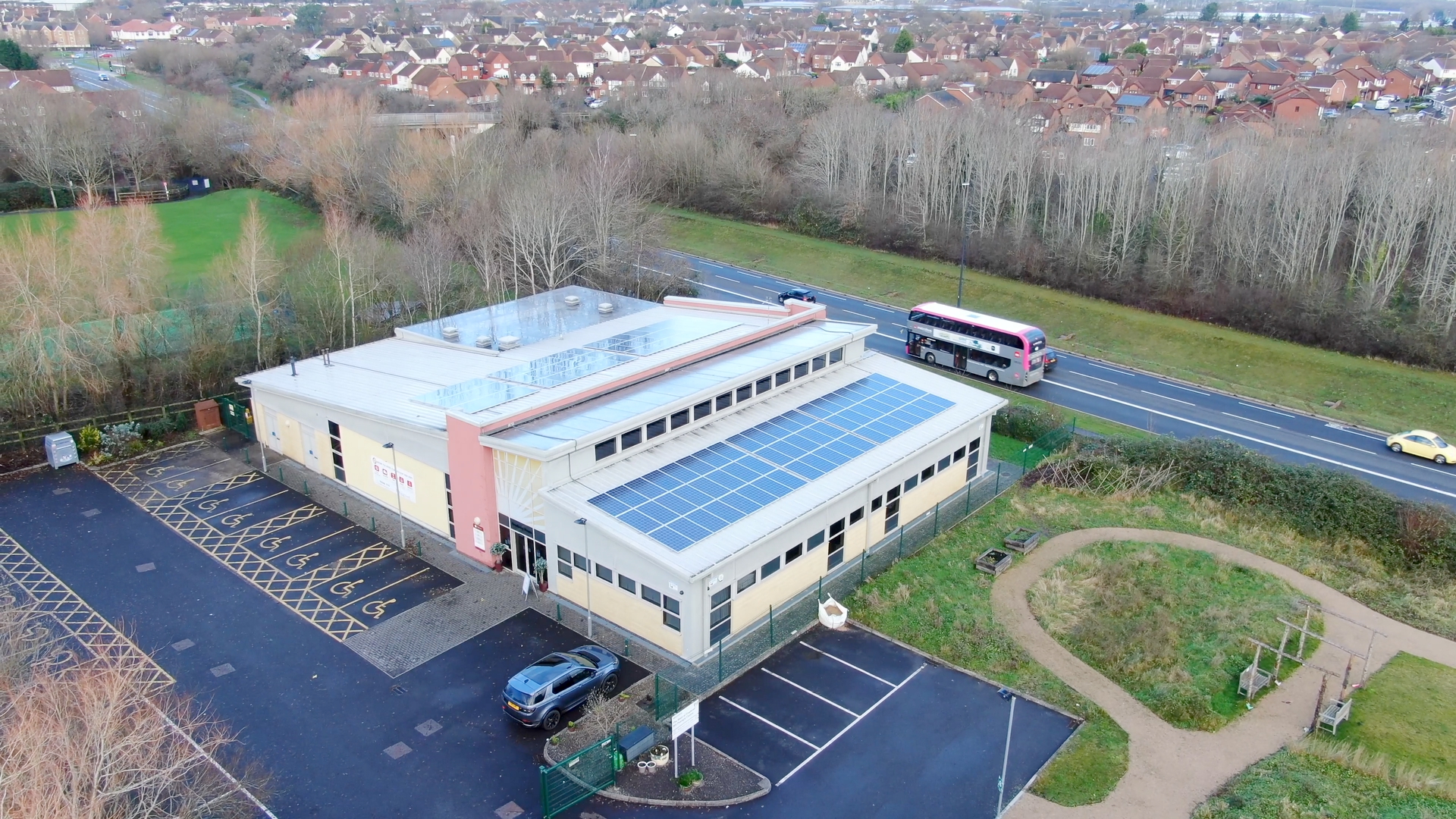
During the last decade alone, Solarsense and their customers have helped to mitigate more than 3 million tons of CO2 emissions by generating, storing and using their own clean energy.
Solarsense specialise in the design, supply, installation and integration of solar photovoltaic (PV) systems, energy storage solutions, solar thermal systems, heat pumps, solar carports and EV charge points.
Just a Quick Note:
InnovationsOfTheWorld.com has partnered with Trade License Zone (TLZ) to support global innovators looking to expand internationally. Take advantage of the UAE’s Free Zones—enjoy streamlined setup, low corporate taxes, and a strategic gateway to the Middle East and beyond.
Get Your UAE Free Zone License Fast & Easy!Since being founded in 1995, Solarsense has completed more than 14,000 clean energy installations and is responsible for powering some of the UK’s leading organisations. From the Duchy of Cornwall, The RSPB and Bristol City Council to Triodos Bank, Lush Cosmetics and Tate Modern, Solarsense has earned a reputation for trusted advice, cutting-edge projects and excellent customer service.
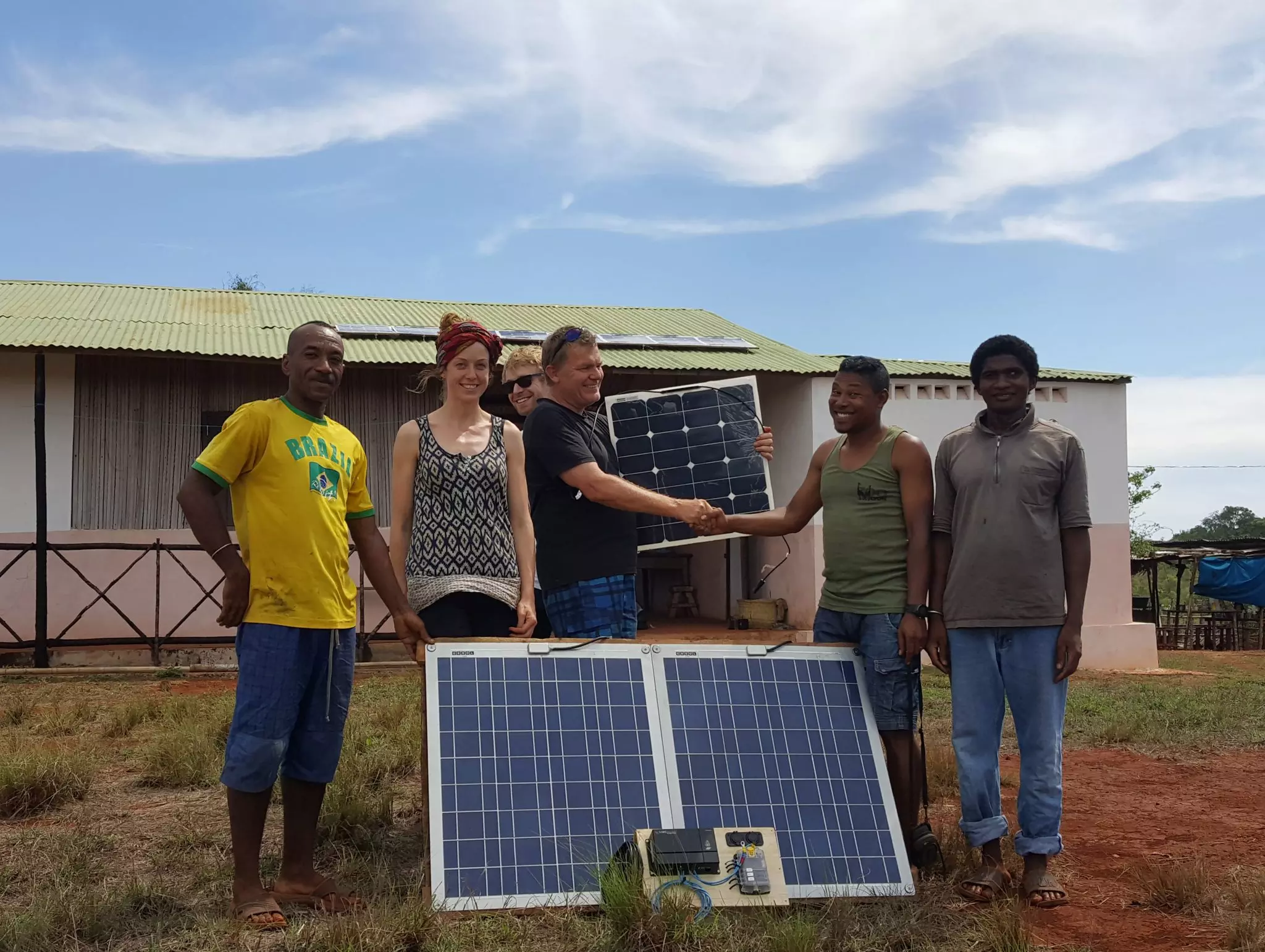
By reducing their own carbon footprint and developing pioneering ways of increasing the uptake of renewables, Solarsense is demonstrating how homeowners and businesses can reduce their environmental impact and is actively supporting the UK towards a greener future.
Helios House plays a part in the overall aim to transform the Solarsense head office into a regional centre of excellence for renewable energy. The state-of-the-art building was designed to generate more energy than it consumes and boasts an extensive array of fully integrated photovoltaic panels, solar PV roof lights, LED lighting, air source heat pump & electric vehicle charge points.
By practising what they preach, Solarsense has invested in a showcase building that utilises the latest technology available for all homes and offices. The building provides an engaging environment for members of the public, businesses, architects and energy consultants to see how easy it is to incorporate renewable energy.
The team at Solarsense feel it’s only right that organisations do what they can to share their knowledge. Each year they invest their time and expertise in direct support of selected charitable projects throughout the UK and overseas. Their latest overseas project saw a team from Solarsense visit one of Bristol Zoological Society’s wildlife conservation projects on the island of Madagascar. The team helped to set up a refurbished solar PV system to power a research and conservation station, helping to protect three types of endangered lemur species.
Solarsense is proud to help their local community and are involved in a number of charitable projects in the UK. Their latest venture was in partnership with the Brightwell Centre, home of the West of England MS Therapy Charity. The charity focuses on helping people with a range of neurological conditions including Multiple Sclerosis and Parkinson’s disease. A specialist team from Solarsense installed a refurbished 30kWp solar panel system. The solar panels, which were removed from an office building (due for refurbishment), will generate 30,000kWh of clean electricity per annum, saving the charity around £4000 per year. As well as saving the charity vital funds, the clean energy system will offset 7,328kg of carbon emissions per year; significantly improving the organisations’ carbon footprint.
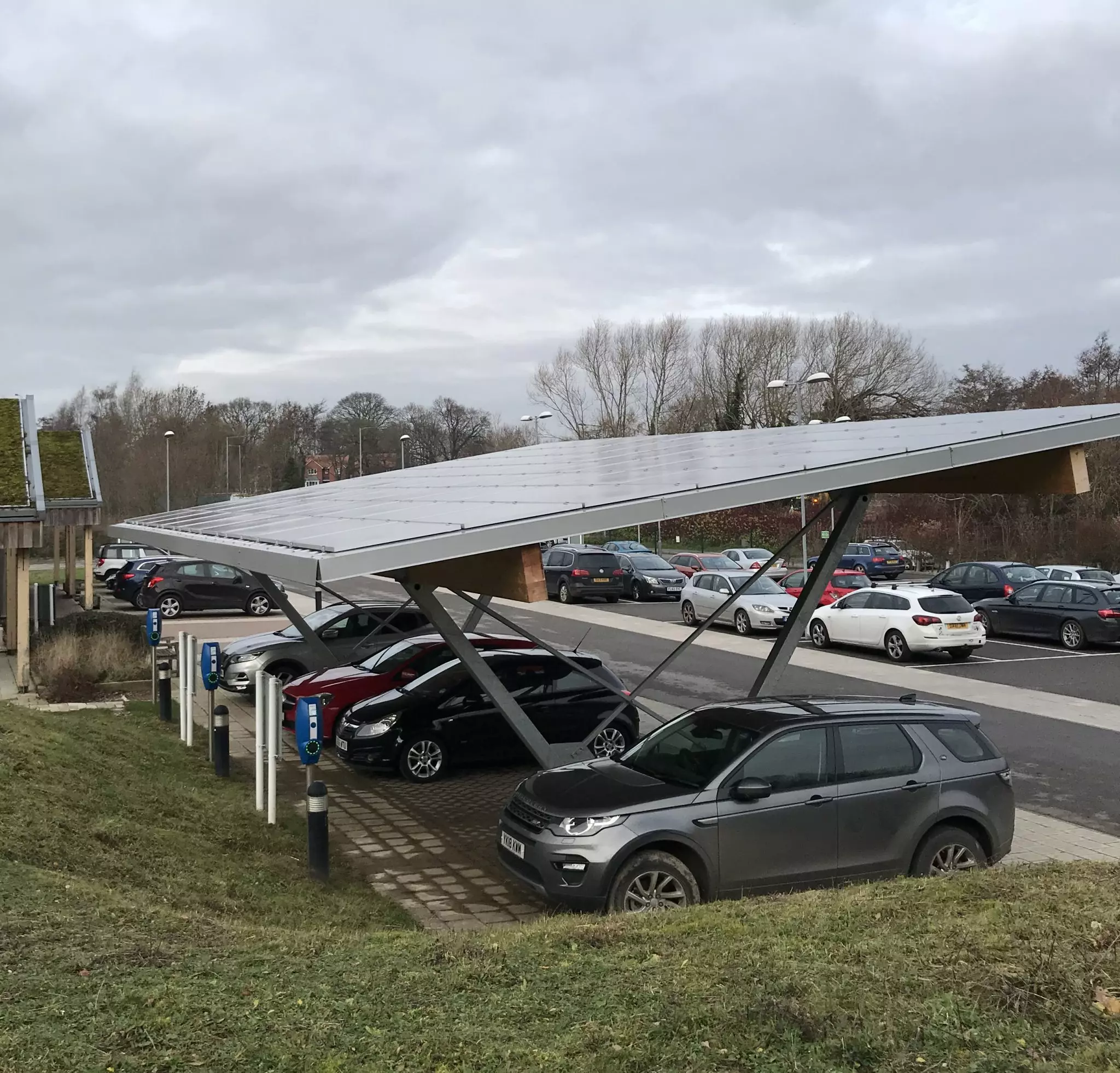
With the future of energy moving rapidly towards electricity, Solarsense is continuously innovating and looking at ways to improve both the energy infrastructure and sustainability. The UK remains a leader in the electric vehicle (EV) revolution, and the government has set a target of halving non-electric vehicle sales by 2030 and ending them by 2040. Whilst the journey to electric vehicles is essential, one of the current barriers to transition is the lack of EV charge point infrastructure. Solar carports offer both a clear solution to this infrastructure need and the means to generate the (clean) energy required to power it.
Solarsense has increased their service offering to include solar carports and is researching and developing their own carport structure to offer their commercial clients a cost-effective solution for generating clean energy on-site and charging their electric fleets with ‘free’ energy generated by the sun.
Solarsense strives to deliver cutting-edge projects and has achieved a number of firsts. A clean energy system installed at Pilton Methodist Church was one of the first projects to integrate solar roof slates, conventional on-roof solar panels and a Tesla Powerwall battery. The system was designed to successfully meet strict requirements for aesthetics, whilst delivering as much on-site energy generation as possible – storing any excess energy to use for late-night services when sunlight is low.
As we look into the future, Solarsense endeavours to stay ahead of the curve, combining the latest technologies to deliver award-winning clean energy projects, helping both the economy and the environment collectively. Working with schools, local authorities, SME’s and blue-chip companies they aim to power the UK towards a clean energy future, one installation at a time.
If your business is considering switching to clean energy, Solarsense will provide you with a free, no obligation desktop survey to identify your break-even point, overall financial profitability and carbon savings for the long term.
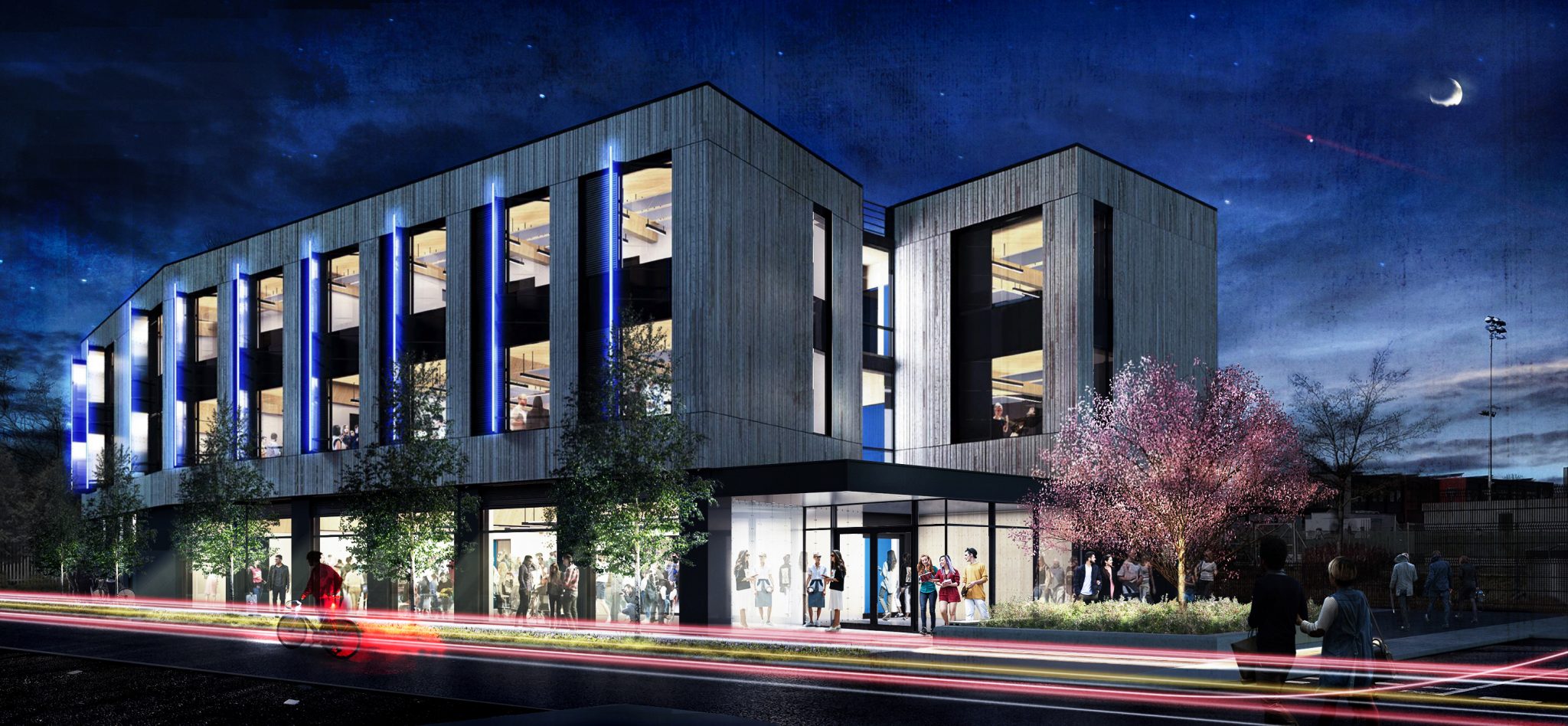
South Gloucestershire and Stroud College – Brunel Centre
Project details
Main Contractor: Willmott Dixon
Architect: Hewitt Studios
Renewable Energy Contractor: Solarsense
Electrical Contractor: CMB Engineering
Brise Soleil Manufacturer: Taunton Fabrications
System Size: 11.07kWp
Estimated annual yield: 7,550kWh
Annual CO2 savings: 2,091kg
Located in Bristol, South Gloucestershire and Stroud College (SGS) is a new school, formed by the merger of Filton and Stroud Colleges in February 2012. The newly constructed Brunel building on the college’s Wise Campus in north Bristol, will be the home to sixth form Science, Maths, Technology and Engineering courses.
The three-storey Brunel Centre at South Gloucestershire and Stroud College puts sustainability at its heart, with a number of key features prominent in its design.
The building is naturally ventilated throughout, uses air source heat pumps, and a solar photovoltaic (PV) system integrated into the building’s brise soleil – just one of the examples of putting renewables at the forefront of design for students to see every day. The building also features a live monitoring panel in the foyer where students can see exactly how much energy, water and other services the building is using.
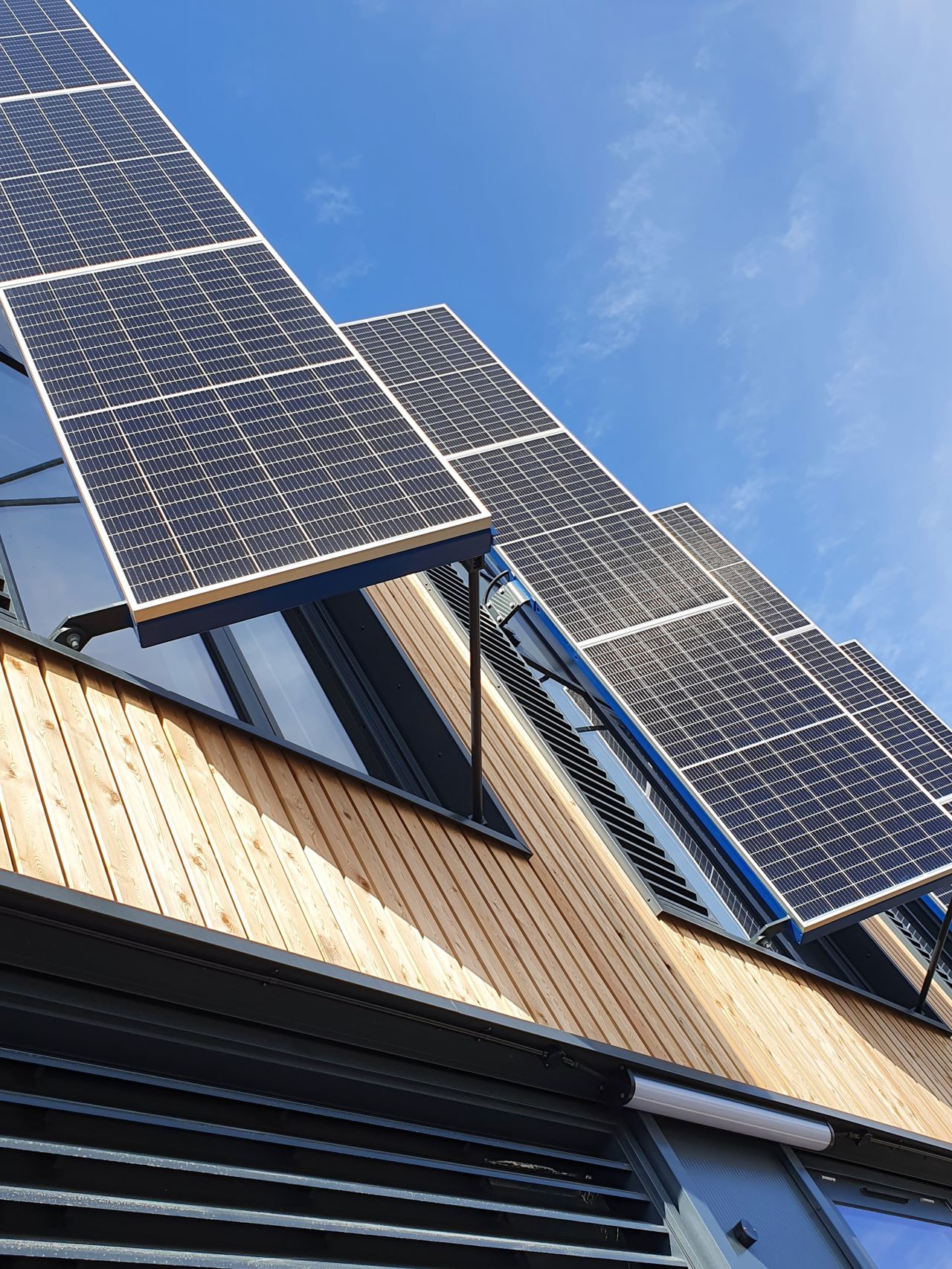
The project also saw the replacement of 400sqm of car park and tarmac replaced with wildflower meadows aimed at encouraging biodiversity on site. The solar brise soleil also features a number of LED lights, making an artistic feature at night.
The project was funded by the West of England Local Enterprise Partnership (LEP) through the Local Growth Fund, administered by the West of England Combined Authority (WECA).
The project required a large amount of coordination between different companies involved in the development. Solarsense worked closely with the main contractor Willmott Dixon, architect Hewitt Studios and electrical contractor CMB Engineering to provide a solar brise soleil system in order to generate clean energy on-site and reduce the sites’ carbon footprint.
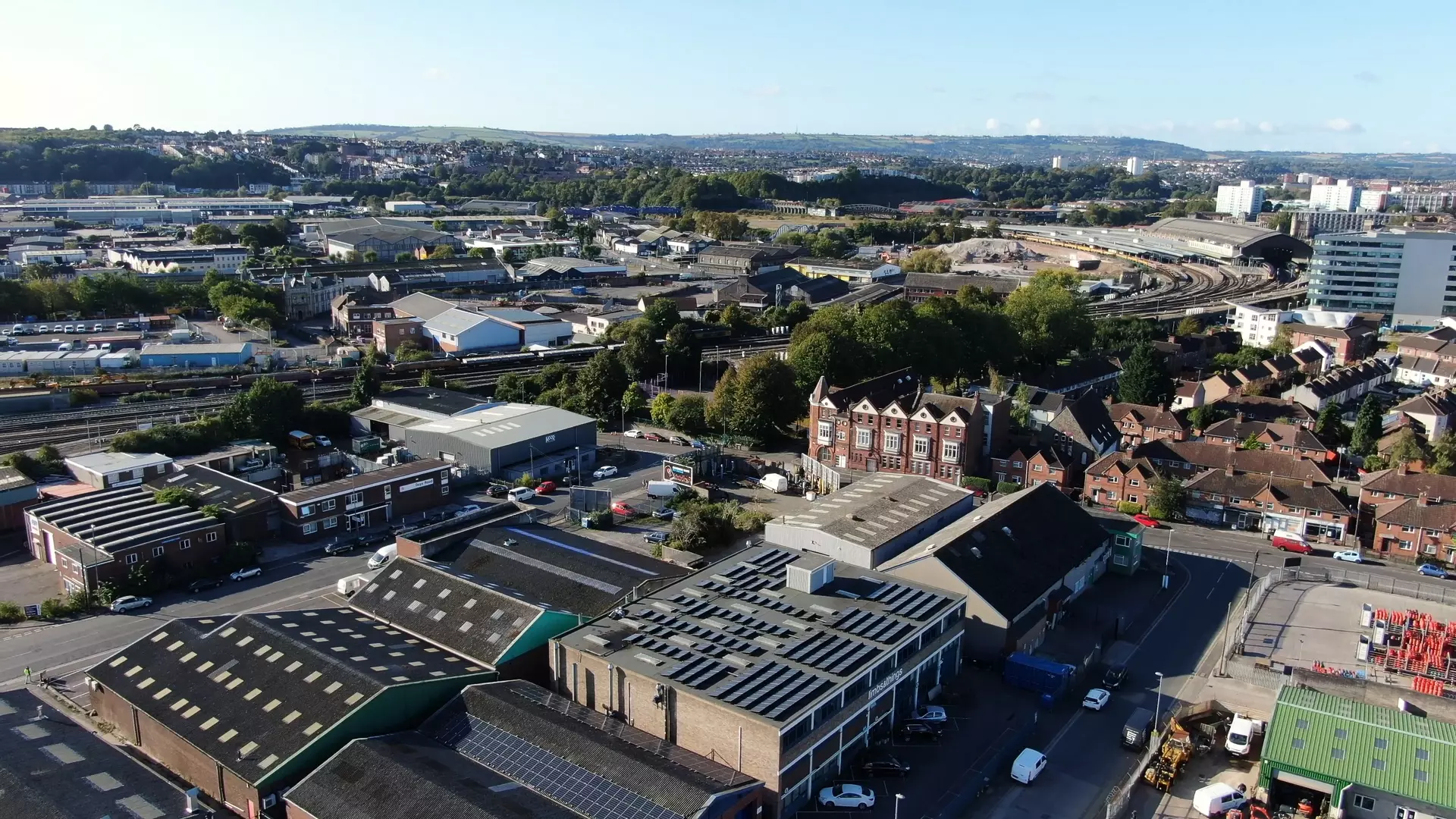
Solarsense also worked closely with brise soleil manufacturer Taunton Fabrications, regarded as one of the leading UK manufacturers of architectural and secondary metalwork to the construction and house building sectors. The solar panels were delivered to the Taunton Fabrication workshop to be fixed to the frames off-site and then delivered to SGS College Brunel Centre in Filton to be craned and fixed to the exterior of the building.
27 x JA Solar 410W panels were fitted vertically to a brise soleil, consisting of 9 banks of 3 panels and connected to an 8kW SolarEdge inverter with solar PV optimisers and a fire fighter gateway to enable remote, panel-level shut down in the event of fire on-site. The smart enabled SolarEdge inverter also communicates with the BMS (Building Management System) to provide system status reporting and feed into the live monitoring panel in the foyer of the building.
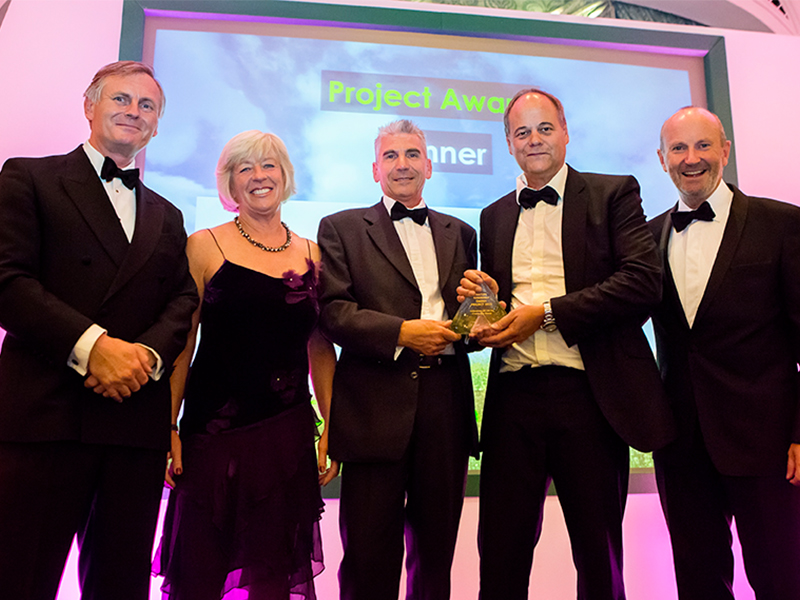
The design engineers at Solarsense opted for high efficiency 410W PV modules to maximise on-site energy generation. SolarEdge optimisers were fitted on each solar panel to enhance the performance of each individual module and minimise the impact of shading issues. SolarEdge technology also meant that each panel could be monitored individually, providing full visibility of the system’s technical and financial performance. The optimisers also allow the DC power generated by the panels to be remotely shut off, so that in the case of a fire there is no live DC power in the building, resulting in a safe environment for fire fighters to enter the building.













